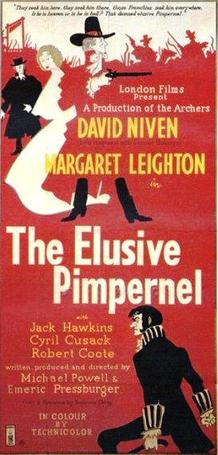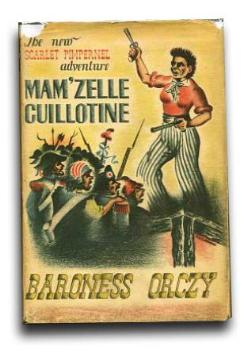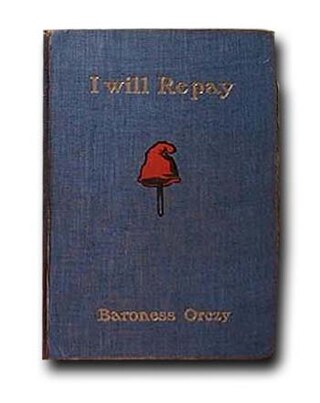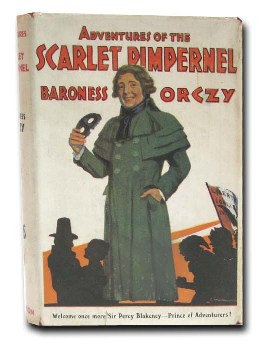Contents
Sir Percy Explains
Madeleine Lannoy, whose husband was killed at Versailles defending the Queen from the mob, has become a street dancer in the worst parts of Paris. She has taken on this guise in the hope of finding her only son who has been stolen by Citizen Jean Paul Marat, annoyed by her spurning his advances. All she knows is that her child "is to be reared up in the company of all that is most vile and most degraded in the disease-haunted slums of indigent Paris" and that if she doesn't find him soon he risks becoming a criminal or a drink-sodden reprobate at best.
A Question of Passports
Citizen Bibot of the Town Guard has command of the Porte Montmartre – the last commandant there, citizen Ferney, was guillotined for having allowed a whole batch of aristos to escape and find safety outside the walls of Paris. Citizen Marat arrives to warn Bibot to be watchful because the Pimpernel has promised to rescue the Duc and Duchesse de Montreux and their family, (who are on their way to the Conciergerie prison) that very evening, but Bibot is determined that the Scarlet Pimpernel will not get one over on him.
Two Good Patriots
Being the disposition of citizeness Fanny Roussell, who was brought up together with her husband, before the Tribunal of the Revolution on a charge of Treason – both being subsequently acquitted.
The Old Scarecrow
Nobody in the quartier could quite recollect when it was that citizen Lepine, the new public letter-writer first set up in business at the angle formed by the Quai des Augustins and the Rue Dauphine; but he certainly was there on 35 February 1793, when Agnes, with eyes swollen with tears, a market basket on her arm and a look of dreary despair on her young face, turned that self same angle on her way to the Pont Neuf, and nearly fell over the rickety construction which sheltered him and his stock.
A Fine Bit of Work
Pierre Lenėgre had been a footman in the household of Marie Antoinette. After speaking out in favour of the Queen in a public place he was denounced by the Committee of Public Safety and would have gone to the guillotine had the Scarlet Pimpernel not saved him. Sir Percy is visiting Pierre's parents when he learns that Père Lenègre has been denounced by the concierge Jean Baptiste, who knows Percy often visits them, and that the gendarmes are on their way to arrest him.
How Jean-Pierre Met the Scarlet Pimpernel
The Marquis and Marquise de Mortaine and their son le Vicomte are hiding from the Revolutionary Guard in the attic of a house in Lyons. Out of money they have not eaten for two days and the young Vicomte is slowly starving to death. Their loyal servant Jean-Pierre is out looking for milk for the child when he passes out from hunger, awaking to the sound of two men talking in English. He tells the crowd who are after them, which direction they have gone in return for a bottle of wine and a roast capon, but he soon feels like a treacherous coward. Having dropped and broken the precious wine bottle he is rescued by the two strangers who listen to his plight and bring food to the starving aristos. It becomes evident that the Vicomte is very ill and must see a doctor at once, but the only man up to the job is the infamous republican Citizen Laporte, who would certainly send them all to the guillotine.
Out of the Jaws of Death
Being a fragment from the diary of Valentine Lemercier in the possession of her great-granddaughter. The Lemercier family have been arrested and imprisoned in a dank vault in the Abbaye. They have been in prison for a fortnight when they hear in the distance a noise like the rumbling of thunder – it is the start of the September massacres and hundreds of men, women and children are being slaughtered in the prisons. They are convinced they are facing death and it seems the moment they are dreading has arrived, for heavy blows are falling against the masonry around their prison window.
The Traitor
November 1793. Lord Kulmsted is a member of the League of the Scarlet Pimpernel, however, for some time he has been an adherent in name only. Whether his embitterment comes from lack of money, or jealously of Sir Percy, his oath of fealty has been broken and the threat of treachery hovers in the air. The Scarlet Pimpernel appears not to heed Kulmsted's disloyalty and, against the wishes of the other league members, includes him in a mission to Paris to rescue some women from the household of Marie Antoinette, condemned to die for their loyalty to their martyred queen.
The Cabaret de la Liberté
Esther Vincent is the daughter of a wealthy banker who has already been sent to the guillotine. Although her father's house and property was confiscated after his death, the representatives of the people never found the millions which he was supposed to have concealed. Esther is now living in one of the poorer parts of Paris while a number of astute jailbirds are plotting to obtain her money and wealth by forcing her to choose between marrying one of their gang, Citizen Merri, or face death. The Pimpernel takes on the guise of Citizen Rateau, a tall, cadaverous-looking creature, with sunken eyes and broad, hunched up shoulders and a dry rasping cough that proclaimed the ravages of some mortal disease. Can he rescue Esther and her English lover Jack Kennard from the evil plot?
"Needs Must—"
Lucile Clamette and her three children are up in front of Commissary Lebel and citizen Chauvelin, who are trying to entrap her former employer, Henri the Vicomte de Montogrueil. Frightened by threats that her children will be sent to a House of Correction on the orders of the Committee of Public Safety, she agrees to write a letter to Henri and his father, the Marquis, as dictated by Chauvelin. The father and son are in possession of some incriminating papers containing evidence of bribes paid to members of the CPS, which have so far allowed them to pass unmolested by the terrorists. If the Marquis hands over the papers they will be soon be arrested and sent to the guillotine but how can he refuse, when Lucile's children are in such danger? Lucile's son runs to the Cabaret de la Liberté to find Citizen Rateau (one of the Pimpernel's recurring alter-egos) and tells him of the family's plight.
A Battle of Wits
Tournefort, a sleuth-hound employed by the Committee of Public Safety, is hanging around a house in St Lazare one night when he hears a voice talking to a 'Madame la Comtesse' and discussing how the diamonds she has left in her château can be recovered. Realising that this can only be the wife of the Comte de Sucy, he listens for more details then demands entry to the house to confront and arrest the traitors. The concierge tells Tournefort that he is imagining things and assures him he has seen no aristos. Tournefort doesn't believe him but despite searching the lodge, fails to find any evidence. Determined to steal a march on citizen Chauvelin, Tournefort enlists the help of citizen Gourdon and a gang of ruffians (which includes one Citizen Rateau) and they ransack the château looking for the missing jewellery, however Chauvelin has got wind of the scheme and presently appears on the scene...

A Tale of Two Cities is a 1935 film based upon Charles Dickens' 1859 historical novel, A Tale of Two Cities, set in London and Paris. The film stars Ronald Colman as Sydney Carton and Elizabeth Allan as Lucie Manette. The supporting players include Edna May Oliver, Reginald Owen, Basil Rathbone, Lucille La Verne, Blanche Yurka, Henry B. Walthall and Donald Woods. It was directed by Jack Conway from a screenplay by W. P. Lipscomb and S. N. Behrman. The film was nominated for the Academy Award for Best Picture and Best Film Editing.

The Scarlet Pimpernel is the first novel in a series of historical fiction by Baroness Orczy, published in 1905. It was written after her stage play of the same title enjoyed a long run in London, having opened in Nottingham in 1903.

Baroness Emma Orczy, usually known as Baroness Orczy or to her family and friends as Emmuska Orczy, was a Hungarian-born British novelist and playwright. She is best known for her series of novels featuring the Scarlet Pimpernel, the alter ego of Sir Percy Blakeney, a wealthy English fop who turns into a quick-thinking escape artist in order to save French aristocrats from "Madame Guillotine" during the French Revolution, establishing the "hero with a secret identity" in popular culture.

Lucie-Simplice-Camille-Benoît Desmoulins was a French journalist, politician and a prominent figure of the French Revolution. He is best known for playing an instrumental role in the events that led to the Storming of the Bastille. Desmoulins was also noted for his radical criticism of the Reign of Terror as the editor of the journal Le Vieux Cordelier. He was a schoolmate and close friend of Maximilien Robespierre and a close friend and political ally of Georges Danton, who were the leading figures in the French Revolution.

The Elusive Pimpernel is a 1950 British period adventure film by the British-based director-writer team of Michael Powell and Emeric Pressburger, based on the novel The Scarlet Pimpernel (1905) by Baroness Emmuska Orczy. It was released in the United States under the title The Fighting Pimpernel. The picture stars David Niven as Sir Percy Blakeney, Margaret Leighton as Marguerite Blakeney and features Jack Hawkins, Cyril Cusack and Robert Coote. Originally intended to be a musical, the film was re-worked as a light-hearted drama.

The Scarlet Pimpernel is a musical with music by Frank Wildhorn and lyrics & book by Nan Knighton, based on the 1905 novel of the same name by Baroness Orczy. The show is set in England and France during the Reign of Terror of the French Revolution. The story is a precursor to the spy fiction and the superhero genres, where a hero hides under a mild-mannered alias.

Don't Lose Your Head is a 1967 British swashbuckling comedy film, the 13th in the series of 31 Carry On films (1958–1992). It features regular team members Sid James, Kenneth Williams, Jim Dale, Charles Hawtrey, and Joan Sims. Set in France and England in 1789 during the French Revolution, it is a parody of Baroness Orczy's The Scarlet Pimpernel.

François-Bernard de Chauvelin, marquis de Grosbois, also known as Marquis de Chauvelin, was a French nobleman, diplomat, parliamentarian and liberal reformer.

Eldorado, by Baroness Orczy is a sequel book to the classic adventure tale, The Scarlet Pimpernel. It was first published in 1913. The novel is notable in that it is the partial basis for most of the film treatments of the original book.

Mam'zelle Guillotine, by Baroness Orczy, is a sequel book to the classic adventure tale, The Scarlet Pimpernel. First published in 1940, it was the last novel Orczy wrote featuring the Pimpernel and is dedicated to those fighting in World War II.
"To all those who are fighting in the air, on the water and on land for our country and for our homes, I dedicate this because it is to them that we shall owe a happy issue out of all our troubles and a lasting peace." - Emmuska Orczy - Monte Carlo - 1939-40

I Will Repay was written by Baroness Emmuska Orczy and originally published in 1906, this is a sequel novel to the Scarlet Pimpernel. The second Pimpernel book written by Orczy, it comes chronologically third in the series, after Sir Percy Leads the Band and before The Elusive Pimpernel.

Lord Tony's Wife, by Baroness Orczy is a sequel book to the classic adventure tale, The Scarlet Pimpernel. It was first published in 1917.

First published in 1908, The Elusive Pimpernel by Baroness Orczy is the 4th book in the classic adventure series about the Scarlet Pimpernel.
Citizen Armand Chauvelin is the villain in Baroness Emmuska Orczy's classic novel The Scarlet Pimpernel and the various plays and films derived from the work.

The Triumph of the Scarlet Pimpernel, first published in 1922, is a book in the series about the Scarlet Pimpernel's adventures by Baroness Orczy. Again Orczy interweaves historic fact with fiction, this time through the real life figures of Thérésa Cabarrus, and Jean-Lambert Tallien; inserting the Scarlet Pimpernel as an instigator of the role Tallien played in the Thermidorian Reaction in July 1794.

Adventures of the Scarlet Pimpernel is the second collection of short stories written by Baroness Orczy about the gallant English hero, the Scarlet Pimpernel and his League. Written in 1929 the stories, which are listed below, are set in 1793 but appear in no particular order. They occasionally refer to events in other books in the series and Orczy frequently reuses plot lines and ideas from the longer Pimpernel novels.

The Scarlet Pimpernel is a 1934 British adventure film directed by Harold Young and starring Leslie Howard, Merle Oberon, and Raymond Massey. Based on the 1905 play by Baroness Orczy and Montagu Barstow and the classic 1905 adventure novel by Orczy, the film is about an eighteenth-century English aristocrat (Howard) who leads a double life, passing himself off as an effete aristocrat while engaged in a secret effort to rescue French nobles from Robespierre's Reign of Terror. The film was produced by Alexander Korda. Howard's portrayal of the title character is often considered the definitive portrayal of the role. In 1941, he played a similar role in "'Pimpernel' Smith" but this time set in pre-WWII Germany.

The Scarlet Pimpernel is a 1982 British romantic adventure television film set during the French Revolution. It is based on the novels The Scarlet Pimpernel (1905) and Eldorado (1913) by Baroness Emmuska Orczy, and stars Anthony Andrews as Sir Percy Blakeney/the Scarlet Pimpernel, the protagonist, Jane Seymour as Marguerite St. Just, the love interest, and Ian McKellen as Chauvelin, the antagonist.

The Return of the Scarlet Pimpernel is a 1937 British film directed by Hanns Schwarz and starring Barry K. Barnes, Sophie Stewart, Margaretta Scott and James Mason. It is a sequel to the 1934 film The Scarlet Pimpernel based on the stories by Baroness Emmuska Orczy.

I Will Repay is a 1923 British silent period film directed by Henry Kolker and starring Holmes Herbert, Flora le Breton, and Pedro de Cordoba. It was based on the 1906 novel I Will Repay by Emma Orczy, which is a sequel to The Scarlet Pimpernel. It was released in the United States under the alternative title Swords and the Woman.


















